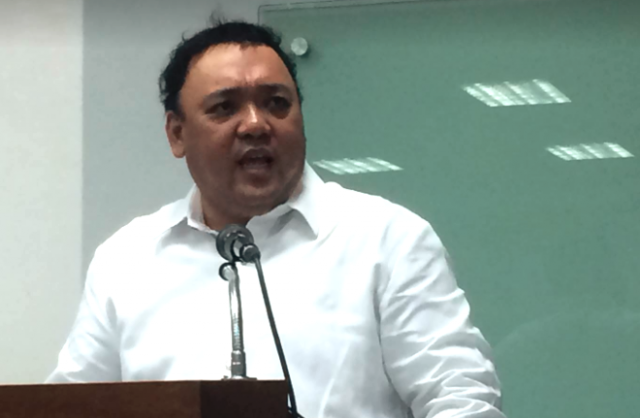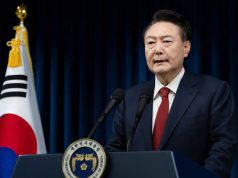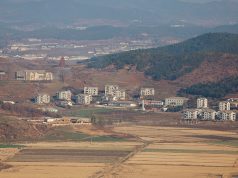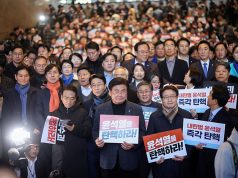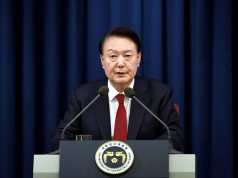(UPDATED – 5:45 P.M.) MANILA, Philippines – “Unli-martial law”, or unlimited martial law, may presumptively be possible, but this will depend on the tact that Congress might take on the subject.
This point was shared by Kabayan partylist Representative Harry Roque during a news conference on Monday, citing the wording of Article VII, Section 8 of the Constitution: “Upon the initiative of the President, the Congress may, in the same manner, extend such proclamation or suspension for a period to be determined by the Congress, if the invasion or rebellion shall persist and public safety requires it.”
Rep. Roque, however, was quick to point out that, nevertheless, for him, any extension to martial law “should only be for the shortest period of time, if ever there will be one.”
“Wala ng limitasyon iyong extension, iyong first 60 days lang (There is no limit to the extension; it’s just the initial declaration that has the 60-day cap). It’s up to Congress to determine how long [the extension will be],” Roque elaborated.
Therefore, because the Constitution is silent on the period of extension, Roque said, “Congress can opt to provide for [or specify] a period.”
President Rodrigo Duterte had recently hinted that he might seek extension of his declaration of martial law covering the entire Mindanao.
The Armed Forces of the Philippines is still assessing the situation to arrive at a recommendation of whether or not to recommend an extension.
Duterte placed Mindanao under martial law and suspended the privilege of the writ of habeas corpus on May 23, a day after the Islamic State (IS)-linked Maute terror group resisted a law enforcement operation, sparking an armed standoff in Marawi City.
In a separate statement, Albay Representative Edcel Lagman advised his colleagues to wait for the President’s initiative before talking about the extension.
“Why are some Senators and Representatives talking about extending martial law in Mindanao when the President has not even officially initiated such extension?” he said.
“Under the Constitution, while an extension needs the concurrence of the absolute majority of the members of the Congress voting in joint session, any such extension shall be upon the initiative of the President,” he added.
Lagman, one of the petitioners before the Supreme Court who sought to nullify the declaration, said it stands to reason that any extension should not exceed the original maximum period of 60 days.
“The guiding constitutional safeguard is the limited duration of martial law and the suspension of the privilege of the writ of habeas corpus,” he said.
Contrary to Roque’s calculation, he added that the 60-day martial law will expire on July 22.
“The computation is ‘exclude the first day and include the last day of the period’,” he said.
Roque said the declaration is to end on July 23. Citing Article 13 of the New Civil Code, he said that in computing a period, the first day shall be excluded, and the last day included.
“This means that the extension, if there is to be one, would commence on the 24th (of July). There should be no problem because we will be in session,” he said.
The Senate and the House of Representatives will open the second regular session of the 17th Congress separately at 10 a.m. on July 24.
At 4 p.m., both chambers would convene in joint session for the President’s State of the Nation Address (SONA).
Roque said the Senate and the House can discuss the martial law extension and vote on it during the joint session, after the SONA, if the Executive Department promptly submits documents justifying the need to go beyond the 60-day period.
Roque said the continuing validity of martial law beyond 60 days will depend on the factual basis to be proffered by the Executive.
“From what I have seen, in terms of fighting it looks to have ebbed down,” Roque said, reflecting on the situation he observed after a recent ocular visit to Marawi City.
“It’s up to the President to ask for it, but, from what I’ve seen so far, there seems to be no firm basis for martial law to be in force in, say, Butuan City, or General Santos City, even in Davao City, but I could see it is badly needed in Marawi City and parts of Lanao del Sur and ARMM (Autonomous Region in Muslim Mindanao), where there could be lairs of extremist groups,” Roque added.
However, he cautioned, the Executive should also be prudent about wanting to prolong the martial law declaration in Mindanao, saying it may give an impression to the international community that the country has long-term peace and order and security problems.
He said this may scare away tourists and businesses.

